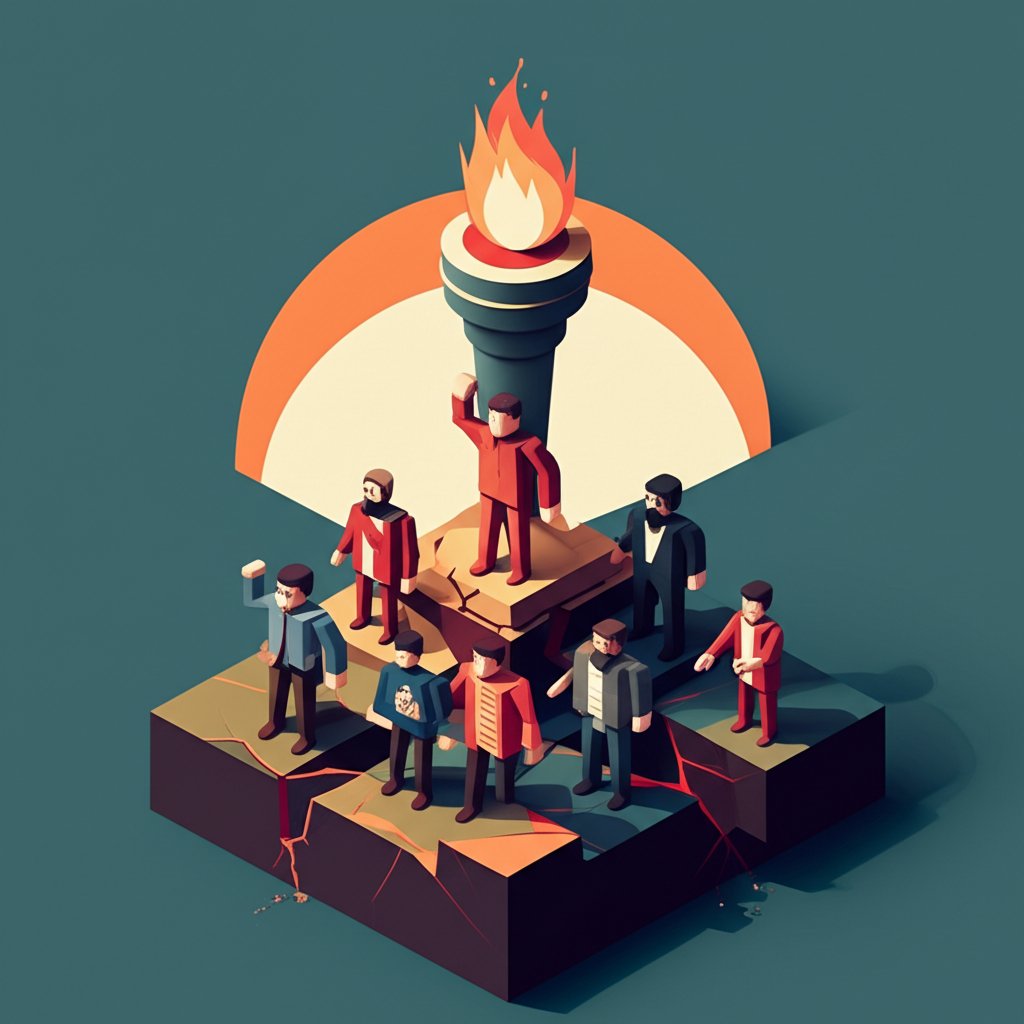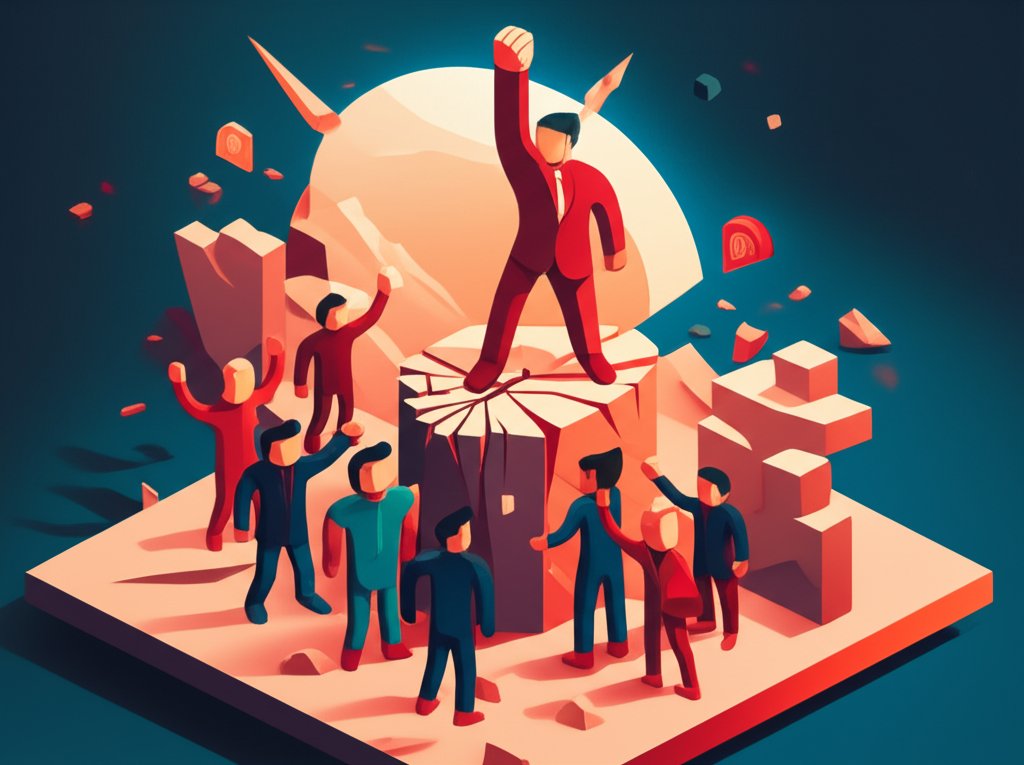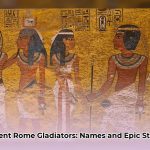From the whispers of discontent to the roar of seismic societal shifts, history is a tapestry woven with the struggles and triumphs of individuals who dared to defy the status quo. These are the revolutionaries in history, figures whose unwavering conviction and strategic brilliance reshaped nations, shattered oppressive systems, and ignited the flames of change that continue to burn centuries later. Understanding these leaders of revolutions is not merely a study of the past; it’s a vital exploration of humanity’s enduring quest for freedom, justice, and a better tomorrow. This comprehensive article delves deep into what defines these extraordinary individuals, examines the core tenets of revolutionary leadership, profiles the most famous revolutionaries in history, and uncovers the profound legacies they left behind. Prepare to journey through time and confront the forces that forged the modern world.
What Defines a Revolutionary? Understanding the Core of Transformative Leadership
At its heart, a revolutionary is more than just a rebel or a dissident. They are architects of radical, often swift, and fundamental change in the political, social, or economic structure of a society. The driving force behind these transformations is often a deep-seated grievance against injustice, oppression, or systemic inequality.
Beyond Simple Rebellion: The Ideological Imperative
Unlike mere insurgents who might seek to replace one ruler with another without altering the fundamental system, true revolutionaries leaders are guided by a compelling ideology. Whether it’s the pursuit of national independence, the establishment of classless societies, the dismantling of racial segregation, or the demand for democratic governance, this ideological clarity provides the vision and justification for their audacious actions. It transforms a scattered rebellion into a cohesive movement with a defined purpose, giving direction to the collective anger and aspiration.
The Catalyst for Change: Why Revolutions Erupt
Revolutions rarely spark from thin air. They are often the culmination of long-standing social, economic, and political pressures. Widespread poverty, economic disparity, political corruption, lack of civil liberties, foreign domination, or acute social injustices act as kindling. The revolutionary leader then acts as the spark, articulating the grievances of the masses, providing a coherent alternative, and demonstrating a path forward. They identify the “problem” and present a “solution,” galvanizing disparate groups into a unified force.
The Role of “Revolutionary Leadership” in Shaping Movements
The success or failure of a seismic upheaval often hinges on the quality of its revolutionary leadership. It requires more than just courage; it demands an intricate blend of strategic foresight, tactical brilliance, ideological steadfastness, and an almost superhuman ability to inspire. Leaders must navigate internal dissent, external opposition, and the unpredictable nature of mass movements, all while maintaining a clear vision for the desired future. They are the interpreters of popular will, the strategists of conflict, and the symbolic embodiment of the revolution itself.
The Indispensable Qualities of “Revolutionaries Leaders”
While diverse in their backgrounds and methods, the most impactful revolutionaries leaders share a set of core attributes that enabled them to challenge the might of established power structures and succeed. These qualities are what elevate them from ordinary individuals to figures of historical magnitude.
Vision and Charisma: Inspiring the Masses
A revolutionary leader must possess a clear and compelling vision of the future they are fighting for. This vision, articulated with persuasive charisma, is what mobilizes people to make immense sacrifices. Charisma allows them to connect with ordinary citizens, articulate complex ideas in relatable terms, and foster an unshakeable belief in the cause. It builds loyalty, bridges divides, and transforms individual despair into collective hope.
Strategic Acumen and Adaptability
Revolutions are complex and unpredictable. Effective revolutionary leadership demands exceptional strategic thinking, whether on the battlefield, in political negotiations, or in the realm of public opinion. Leaders must be able to assess political landscapes, anticipate enemy moves, devise innovative tactics, and, crucially, adapt swiftly to changing circumstances. Rigidity in the face of evolving challenges often spells doom for revolutionary movements.
Unwavering Resolve and Personal Sacrifice
The path of a revolutionary is fraught with peril. Imprisonment, exile, torture, and death are constant threats. The most revered revolutionaries in history demonstrated an almost superhuman level of resolve, enduring immense personal suffering without faltering. Their willingness to sacrifice their own comfort, freedom, and even lives for the cause serves as a powerful testament to their commitment, inspiring similar dedication from their followers. This personal sacrifice lends authenticity and moral authority to their leadership.
The Power of Communication and Propaganda
To rally a nation, or even a global movement, leaders of revolutions must be master communicators. They utilize speeches, pamphlets, manifestos, and increasingly, modern media, to disseminate their ideology, galvanize support, demoralize opponents, and shape public perception. Effective propaganda, whether based on truth or strategic messaging, is a critical tool for building a unified front and sustaining revolutionary fervor.
A Pantheon of “Famous Revolutionaries in History”: Case Studies in Transformation
The annals of history are filled with extraordinary individuals who, through sheer force of will and a burning desire for change, altered the course of human events. Here, we unmask some of the most prominent revolutionaries in history, examining their unique contributions to their respective epochs.
George Washington: Forging a Nation Through Enlightenment Ideals
George Washington stands as an icon of revolutionary leadership, instrumental in the birth of the United States. His leadership during the American Revolution (1775-1783) was less about charismatic oratory and more about unwavering resolve and strategic patience. Despite numerous setbacks, his ability to keep a poorly supplied and often disheartened Continental Army united against the formidable British Empire was a testament to his character. Washington embodied the Enlightenment ideals of self-governance and liberty, skillfully navigating both military and political challenges. His decision to voluntarily relinquish power after two terms as president set a crucial precedent for democratic transfer of power, distinguishing him from many other victorious military leaders in history and solidifying America’s nascent republican ideals.
Toussaint Louverture: The Architect of Haitian Freedom
Born into slavery in the French colony of Saint-Domingue, Toussaint Louverture orchestrated the only successful slave revolt in world history, leading to the establishment of Haiti as the first independent black republic. His revolutionary leadership during the Haitian Revolution (1791-1804) showcased remarkable military genius, political shrewdness, and diplomatic skill. He transformed enslaved people into a disciplined army capable of defeating the forces of France, Spain, and Great Britain. Louverture’s vision extended beyond mere freedom from bondage; he sought to create an independent, self-governing nation where all citizens, regardless of their skin color, held equal rights. His legacy is a powerful testament to the universal human right to liberty and self-determination.
Simón Bolívar: The Liberator of South America
Often hailed as “El Libertador,” Simón Bolívar embodied the spirit of revolutionary leadership in South America. Inspired by Enlightenment ideals and the American and French Revolutions, Bolívar dedicated his life to liberating much of South America from Spanish colonial rule. Leading a series of arduous military campaigns, he secured independence for Venezuela, Bolivia, Colombia, Ecuador, Peru, and Panama during the early 19th century. His dream of a unified “Gran Colombia” ultimately splintered, but his military prowess, intellectual depth, and tireless efforts established the foundations for modern Latin American nations. Bolívar remains a potent symbol of pan-American unity and anti-colonial struggle.
Vladimir Lenin: Architect of the Bolshevik Revolution
Vladimir Lenin was a pivotal figure among the revolutionaries leaders of the 20th century, forever changing the course of Russia and inspiring communist movements globally. As the intellectual and political architect of the Bolshevik Revolution (1917), Lenin skillfully adapted Marxist theory to the specific conditions of imperial Russia. His disciplined, vanguard party organization, coupled with his uncompromising vision for a socialist state, allowed him to seize power amidst the chaos of World War I. His revolutionary leadership was characterized by strategic cunning, ruthless determination, and the ability to mobilize a dedicated cadre of followers, ultimately leading to the establishment of the Soviet Union.
Mahatma Gandhi: The Power of Nonviolent “Revolutionary Leadership”
Mohandas Karamchand Gandhi, famously known as Mahatma Gandhi, demonstrated a profoundly different, yet equally powerful, form of revolutionary leadership. He spearheaded India’s independence movement against British colonial rule through a philosophy of nonviolent civil disobedience, known as Satyagraha. Gandhi’s moral authority, personal asceticism, and unwavering commitment to truth and non-violence inspired millions across India and the world. His methods, which included boycotts, marches, and hunger strikes, proved that oppressive regimes could be challenged and overcome without resorting to armed conflict, making him one of the most unique and influential revolutionaries in history. His legacy profoundly influenced civil rights movements globally, including that of Martin Luther King Jr.
Mao Zedong: Reshaping China’s Destiny
Mao Zedong was the primary founder of the People’s Republic of China and one of the most transformative revolutionaries leaders of the 20th century. His revolutionary leadership guided the Communist Party of China through decades of civil war, resistance against Japanese invasion, and ultimately, the establishment of the PRC in 1949. Mao’s adaptation of Marxism-Leninism to an agrarian society, emphasizing the role of the peasantry, was a doctrinal innovation known as Maoism. While revered for uniting China and transforming it into a major world power, his leadership also led to devastating campaigns like the Great Leap Forward and the Cultural Revolution, resulting in immense human cost and making his legacy profoundly complex and controversial.
Nelson Mandela: From Prisoner to President
Nelson Mandela stands as a towering figure among famous revolutionaries in history for his struggle against apartheid in South Africa. Imprisoned for 27 years for his activism against racial segregation, Mandela emerged not with a call for vengeance, but for reconciliation. His revolutionary leadership transcended mere political struggle, becoming a global symbol of justice, forgiveness, and the triumph of the human spirit over oppression. Upon his release, he skillfully negotiated a peaceful transition to multi-racial democracy, becoming South Africa’s first black president. Mandela’s commitment to dialogue and nation-building in the face of deep-seated racial divisions solidified his place as a moral compass for the world.
Fidel Castro: Cuba’s Enduring Revolutionary
Fidel Castro led the Cuban Revolution, toppling the U.S.-backed dictatorship of Fulgencio Batista in 1959 and establishing the first communist state in the Western Hemisphere. His revolutionary leadership was characterized by a powerful anti-imperialist stance, a fierce commitment to Cuban sovereignty, and a socialist vision for his country. Castro defied U.S. attempts to overthrow his government for decades, becoming a symbol of resistance for many developing nations. While his government brought significant advancements in healthcare and education, it also suppressed political dissent and faced severe economic challenges. Castro’s enduring presence on the world stage and his impact on global power dynamics make him an undeniable figure among the most famous revolutionaries in history.
The Enduring Impact of “Leaders of Revolutions” on Global Societies

The actions of leaders of revolutions reverberate far beyond their immediate historical context, shaping the geopolitical landscape, social norms, and economic systems for generations. Their influence is often foundational, even if the outcomes are not always what they initially envisioned.
Political System Transformations
The most obvious impact of revolutionary leaders is the overthrow of old political orders and the establishment of new ones. From monarchies giving way to republics, or colonial rule replaced by independent nations, these leaders fundamentally alter governance. They introduce new constitutions, legal frameworks, and administrative structures, often laying the groundwork for enduring democratic or authoritarian systems. The American Revolution, for instance, birthed a democratic republic that inspired countless others, while the Russian Revolution ushered in a communist state that lasted for seven decades.
Social and Economic Restructuring
Revolutions are not merely political; they often aim for radical social and economic change. Revolutionaries in history frequently seek to redistribute wealth, lands, and power, dismantling old class structures, feudal systems, or racial hierarchies. The Haitian Revolution ended slavery, the Chinese Revolution redistributed land to peasants, and the Cuban Revolution implemented widespread social welfare programs. While these changes often come with immense upheaval and violence, they fundamentally alter the lives and opportunities of millions.
Inspiration for Future Movements
The courage and achievements of famous revolutionaries in history serve as powerful inspiration for subsequent generations. Their stories become narratives of liberation, fueling anti-colonial movements, civil rights struggles, and calls for democracy across the globe. The strategies employed by a Gandhi, a Mandela, or a Bolívar are studied and adapted by activists seeking change in different contexts, demonstrating the enduring power of their methods and ideals.
The Complex Legacies of Revolutionary Change
It is rare for the legacy of revolutionaries leaders to be unequivocally positive or negative. Their actions often bring about progress and liberation for some, while simultaneously leading to oppression, violence, or economic hardship for others. The very act of revolution is inherently disruptive, and the transition to a stable, just new order is frequently fraught with challenges. Understanding their full impact requires acknowledging both the triumphs and the tragedies, the enduring freedoms, and the painful costs.
Key Challenges and Controversies Faced by Revolutionaries
The path of a revolutionary is seldom smooth. Even the most successful revolutionaries in history faced immense hurdles, both during their struggle for power and in attempting to consolidate it. These challenges often lead to controversies that define their complex legacies.
Maintaining Unity and Controlling Factions
Early in a revolution, diverse groups unite against a common enemy. However, once the initial victory is achieved, ideological differences and personal ambitions often lead to internal strife. Revolutionary leaders frequently grapple with maintaining unity among various factions, often resorting to purges or authoritarian measures to consolidate power, as seen in the aftermath of the French and Russian Revolutions. This internal struggle can be as perilous as the fight against the old regime.
The Price of Change: Violence and Human Cost
Virtually all revolutions involve some degree of violence, whether against the ancien régime or in the civil wars that often follow. Leaders of revolutions must make difficult decisions regarding the use of force, often leading to significant human casualties. The moral calculus of sacrificing lives for an idealized future is a heavy burden, and the ethical implications of revolutionary violence remain a subject of intense historical debate. The scale of suffering in the Chinese Revolution under Mao and the Russian Revolution under Lenin highlights this grim reality.
The Transition from Revolutionary to Statesman
One of the greatest challenges for revolutionaries leaders is the transition from leading a movement against an existing authority to becoming the authority itself. The skills required to incite rebellion and wage war are often different from those needed to build and govern a stable nation. Some, like George Washington and Nelson Mandela, successfully made this transition, upholding democratic principles. Others, like Lenin and Castro, solidified power through authoritarian means, arguing that such measures were necessary to protect the revolution’s gains, leading to debates about whether the revolution truly delivered on its promises of freedom.
Conclusion

The revolutionaries in history are more than just names in textbooks; they are the titans whose defiance, vision, and often, sheer force of will, have shaped the world as we know it. From the battlefields of colonial America to the prisons of apartheid South Africa, these leaders of revolutions remind us of humanity’s ceaseless drive towards transformation. They teach us that change, though often brutal and costly, is an inherent part of the human journey. While their methods and ideologies varied wildly, the common thread of revolutionary leadership — of inspiring millions to believe in a radically different future — remains a powerful testament to the agency of individuals and collectives alike. By unmasking their stories, we gain invaluable insights into the forces that dismantle oppression, forge nations, and redefine human liberty, ensuring that their impactful legacies continue to resonate and inform our understanding of progress and power today.
FAQ Section
Q1: Who are the most famous revolutionaries in history?
A1: While “most famous” can be subjective, widely recognized famous revolutionaries in history include George Washington, Toussaint Louverture, Simón Bolívar, Vladimir Lenin, Mahatma Gandhi, Mao Zedong, Nelson Mandela, and Fidel Castro, among many others who profoundly impacted their nations and the world.
Q2: What defines effective revolutionary leadership?
A2: Effective revolutionary leadership is characterized by a compelling vision, strategic acumen, charisma to inspire and mobilize masses, unwavering resolve in the face of adversity, and the ability to articulate grievances and propose a coherent alternative to the status quo. They must also be adaptable and capable communicators.
Q3: What is the primary goal of revolutionaries leaders?
A3: The primary goal of revolutionaries leaders is to achieve fundamental, often radical, change in the political, social, or economic structure of a society. This can range from gaining national independence, overthrowing oppressive regimes, establishing new forms of government, or achieving social and economic equality for marginalized groups.
Q4: How do revolutionaries in history impact global societies?
A4: Revolutionaries in history impact global societies by directly transforming political systems (e.g., from monarchy to republic), restructuring social and economic orders (e.g., ending slavery, redistributing land), and providing powerful inspiration for future movements for liberation and justice worldwide. Their actions create ripple effects that shape international relations and human rights discourse.
Q5: What challenges do leaders of revolutions typically face?
A5: Leaders of revolutions face numerous challenges, including intense opposition from existing power structures, maintaining unity among diverse revolutionary factions, the moral and practical dilemmas of violence and human cost, and the difficult transition from leading a rebellion to governing a new state. Establishing a stable and just post-revolutionary order is often their greatest hurdle.










